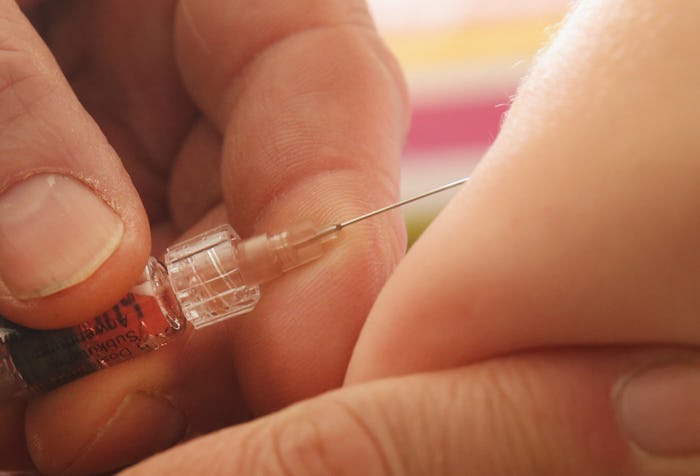Life

CDC Now Recommends A Third Dose Of Mumps Vaccine For Some Kids
The dangerous growing trend of forgoing childhood vaccinations has led to a rise in a disease most parents of small children are too young to even remember. Immunizations lose effectiveness over time, and with outbreaks becoming more commonplace, it might be time to consider whether your child should receive an extra mumps vaccine. Last October, the Centers for Disease Control and Prevention Advisory Committee on Immunization Practices unanimously recommended that those at risk of mumps during an outbreak should receive a third dose of mumps-containing vaccine (either measles-mumps-rubella, commonly referred to as MMR, or measles, mumps, rubella, and varicella, also known as MMRV).
According to the American Academy of Pediatrics, the current schedule of two doses is still effective, but immunity decreases over time, so patients who live, work, or go to school in close contact settings are particularly at risk of contracting the disease during an outbreak, the incidence of which has been increasing since 2006. Between January 2016 and June 2017, there were 150 mumps outbreaks in the United States, causing 9,200 cases in people with a median age of 21. Half of these outbreaks occurred at universities, 32 percent were in community groups or sports teams, 13 percent were in schools, and 5 percent were in households.
According to the CDC, mumps symptoms include fever, headache, muscle aches, tiredness, loss of appetite, and swollen and tender salivary glands. That may sound like no big deal to those who grew up at a time when it was no longer a routine childhood illness, but in some cases, mumps can lead to complications such as inflammation of the ovaries, breast tissue, or testicles (the latter of which can lead to fertility problems); as well as encephalitis, meningitis, or deafness. Infected people can spread the virus by coughing, sneezing, or even talking. It can also be contracted by sharing drinks or food, or touching objects or surfaces that an infected person has touched.
On Friday, the CDC officially endorsed the ACIP recommendation, noting that of those 9,200 recently recorded cases, 5,015 patients were known to have previously received the recommended two doses of MMR vaccine. The effectiveness of two doses is thought to range from 31 to 95 percent. Originally, only one dose of the MMR vaccination was recommended, but it was increased to two in response to a series of measles outbreaks in the late 1980s.According to the CDC, those updated guidelines led to a substantial reduction in measles and mumps cases, but in 2006, the mumps came back in a big way, even in populations with high two-dose coverage. Though things temporarily improved, 2016 saw a 10-year high in mumps cases, and though 2017 data is still being compiled, it's on track to match the previous year.
The CDC's Morbidity and Mortality Weekly Report observed that there were, as expected, lower rates of mumps among people who received a third dose during the outbreak compared with those who had only received two doses. Evidence of decreased effectiveness over time was made clear by the fact that those who received their second dose 13 or more years prior to the outbreak had nine or more times the risk for contracting mumps than those whose second dose was administered within the last two years.
Five studies of patients who received a third MMR vaccine dose found that among the 14,368 total subjects, no serious side effects were reported, and mild side effects were rare and short-lived. Just 6 to 7 percent of children and 6 to 12 percent of young adults experienced swollen lymph nodes, diarrhea, headache, or joint pain, which lasted a median of one to three days.
A routine third MMR or MMRV dose is not yet officially recommended for everyone by the CDC, but that may be forthcoming once more research has been completed. The American Academy of Pediatrics (AAP) is expected to make its own recommendation upon review of the CDC data. In the mean time, if there's a mumps outbreak in your area, ask your child's pediatrician if they believe a third vaccination would be beneficial. And if they haven't already had their recommended doses, please get them before it's too late.
Check out Romper's new video series, Romper's Doula Diaries:
Watch full episodes of Romper's Doula Diaries on Facebook Watch.